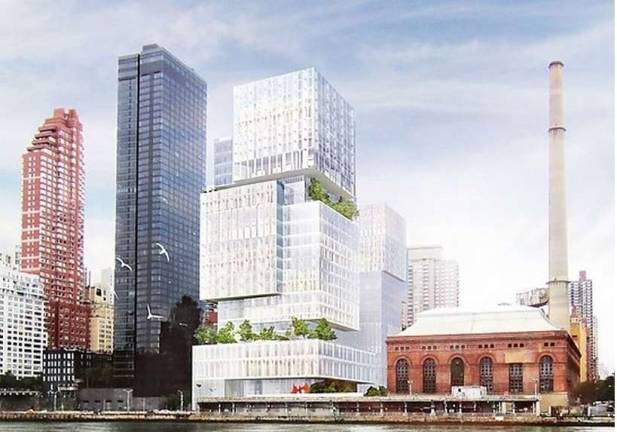a debate over parking on 74th Street News

Will the looming educational and medical complex on 74th Street create a parking and safety problem?
By Daniel Fitzsimmons
A joint-venture by Memorial Sloan Kettering Hospital and CUNY Hunter College to build a medical and educational facility on East 74th Street has cleared almost every hurdle needed before construction can begin.
Taken together, the hospital and school will occupy a 1.1 million-square-foot building on 74th Street between York Avenue and FDR Drive. Sixty percent of the space will be allocated to MSK’s cancer outpatient facility and CUNY will occupy the remaining 403,000 square feet.
The only thing standing in the project’s way is an appeal of a dismissed lawsuit that was brought by Yorkville residents who allege the city engaged in spot zoning when it approved the project and that its environmental review process was flawed.
But another, much smaller, component of the lawsuit has raised a question over whether MSK/CUNY, and the city in approving the application, provided an adequate amount of parking to meet the new facility’s demand.
Al Butzel, an attorney representing the Yorkville residents who brought the suit, organized under the moniker Residents for Reasonable Development, said demand for parking will far exceed supply when the facility is completed in 2019.
“There’s going to be huge amounts of traffic going into this space and it’s going to overwhelm any parking garage capacity that they’re building,” said Butzel. “It’s going to overwhelm the neighborhood because [the MSK facility] is ambulatory. Everyone has to come either by taxi, car, foot or bus, and a lot of people are going to come by car. They’re going to jam up the streets and make things miserable for everyone.”
According to MSK/CUNY’s study of the impact that their facility will have on the surrounding community, the proposed project will generate 316 vehicle trips during peak morning hours, 329 vehicle trips during peak midday hours, and 375 vehicle trips during peak evening hours.
Those projections take into account trips made by personal vehicles, taxis, delivery trucks and ambulances, and include projections for both the MSK and CUNY facilities. According to MSK/CUNY, access and egress to the garage, which would be provided via valet parking, will be located on the south side of East 74th Street.
To mitigate the parking volume, MSK/CUNY plans to build an underground, 248-space parking facility. Of those who cannot find parking space in their facility, “drivers would drop off the patients at the [MSK facility] first before circulating to find off-site parking,” according to the study.
A spokesperson for MSK said the planned parking facility will be for patients and visitors to the facility, and that CUNY Hunter staff will not be allowed to park there while MSK staff will be asked to park elsewhere.
“The [environmental review] showed that few, if any, CUNY/Hunter staff would drive to the facility and therefore parking was not needed for that portion of the project,” said the spokesperson. “MSK agreed to a series of measures to encourage staff parking at the farther ring of garages.”
But Bob Jackman, a Yorkville resident who chairs Residents for Reasonable Development, pointed out that it’s not so much a lack of parking that’s the issue, but rather traffic safety for pedestrians in an already congested part of the Upper East Side.
“This community is already overburdened with traffic around 74th Street and you can’t get anywhere on York Avenue in the morning or afternoon,” said Jackman. “To think that we’re going to add to that, during the day, is incredible. The impact on traffic safety in the community is going to be extreme.”
In dismissing RRD’s suit, Judge Alexander Hunter said MSK/CUNY’s existing environmental impact statement, which includes transportation and traffic studies, is sufficient.
Butzel questioned the validity of the MSK/CUNY traffic studies and said it’s hard to challenge, in court, reports that are carried out by experts hired by an applicant.
“It’s all just done with smoke and mirrors, but you can’t really attack it,” said Butzel. “It’s part of our suit but not really a strong part.”
According to City Planning’s report on the project, MSK/CUNY is actually building more parking space than current zoning provides for in that area. In its review of the proposal, the planning commission said MSK/CUNY applied for a permit to build 248 parking spaces in their underground garage, 82 more than the 166 spaces that would be, “permitted as‐of‐right on the subject property.”
“[MSK/CUNY] has indicated that they expect many of those visiting the facility for treatment to arrive primarily by automobile, thereby generating a greater need for parking spaces,” said the commission in approving MSK/CUNY’s permit for more parking space. “The commission believes that the accessory garage would adequately provide for the patient and visitor communities and minimize the demand for parking and consequent traffic and circulation in the vicinity of the building.”
Jackman disagrees. If construction goes ahead as planned, he said, the facility will put Yorkville residents at risk, particularly the elderly and school-aged children.
“Within three or four blocks of the proposed facility, there’s a public elementary school, two private schools, and a public high school. There’s also a preschool on the same block as this planned facility. You’re talking about a real concentration of kids in this area,” he said. “I think we’ll see more pedestrian injuries and deaths as a result [of the MSK/CUNY facility].”